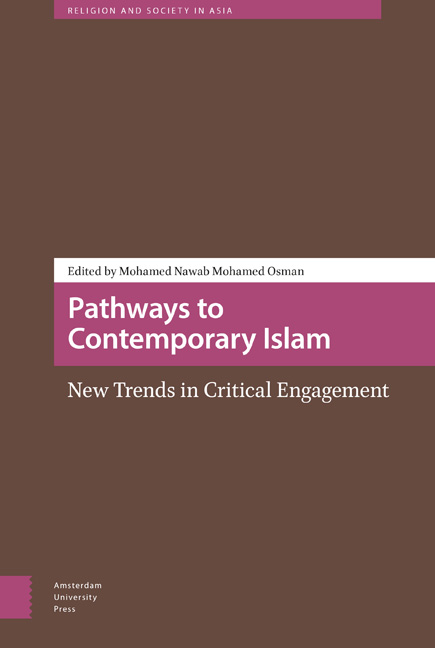Book contents
- Frontmatter
- Dedication
- Contents
- Acknowledgements
- Introduction: Constructing Pathways to Contemporary Islam
- Section 1 Historical Trends in Contemporary Perspective
- Section 2 Contesting the Islamic Intellectual Tradition
- Section 3 Beyond the Arab Revolutions: Political Islam Revised
- Section 4 Contemporary Spaces of Critical Engagement
- Notes on the Contributors
- Index
Introduction: Constructing Pathways to Contemporary Islam
Published online by Cambridge University Press: 25 November 2020
- Frontmatter
- Dedication
- Contents
- Acknowledgements
- Introduction: Constructing Pathways to Contemporary Islam
- Section 1 Historical Trends in Contemporary Perspective
- Section 2 Contesting the Islamic Intellectual Tradition
- Section 3 Beyond the Arab Revolutions: Political Islam Revised
- Section 4 Contemporary Spaces of Critical Engagement
- Notes on the Contributors
- Index
Summary
The legacies of late eighteenth-century modernization theory are still present in the contemporary study of culture and religion. Based on the unique experience of Europe, modernization, coupled with ideas of civilization, reason, and progress, came to be understood as the antithesis of culture and religion. Seen as an obstacle to the achievement of modernization, religion was separated from the secular space of politics. Secularization, the hallmark of modernity, described a process of social change which implied that, as modernization advances, religion will wither away. Once a powerful authority in political affairs, religion was singled out, privatized and its influence diminished.
The founding fathers of modern sociology, Weber, Durkheim, and Marx saw religion as reducible to more basic factors: for Marx it was of secondary effect to economic causes; Durkheim acknowledged the social origin of religion and its importance in social dynamics; while Weber emphasized the role of the traditional attitudes of Protestantism in capitalist development. In anthropology, Clifford Geertz, the most influential cultural anthropologist at the height of the secularization thesis, did not hold back in predicting the eventual triumph of science over religion.
The most fervent supporter of the secularization thesis, Peter Berger, predicted that ‘by the 21st century, religious believers are likely to be found only in small sects, huddled together to resist a world-wide secular culture’. He later re-visited his position, realizing that the world is ‘as furiously religious as it ever was’. The theoretical advancements of the time created a deep divide in the sociology of religion between the secular and the religious, as well as the idea of an anomalous resurgence of religion in international politics, whose profound normative authority still affects contemporary research and understanding.
However, with the fall of the modernization theory and following the end of the Cold War, academics observed the increased relevance of religion in world affairs ‘as a return to business as usual’. Likewise, the separation between religion and politics is deemed as socially constructed. More recent scholarship claims that ‘to define the boundaries of the secular and the religious is itself a political decision’. Also, it sought out to re-examine the uncritical reification of religion as fundamentally distinct from politics.
- Type
- Chapter
- Information
- Pathways to Contemporary IslamNew Trends in Critical Engagement, pp. 13 - 24Publisher: Amsterdam University PressPrint publication year: 2020



